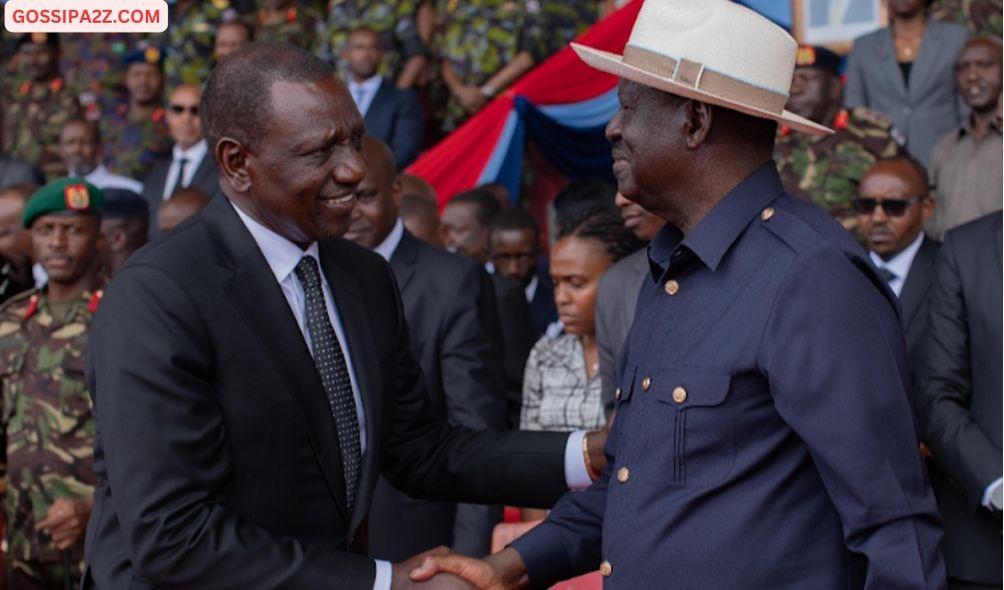Ruto, Raila, and Kenya’s Political Quagmire: The Lure of Unwritten Deals Amid Broken MoUs
The unwritten political arrangement between President William Ruto and ODM leader Raila Odinga, built primarily on trust, has ignited discussions within a political environment marked by broken Memorandums of Understanding (MoUs).
Despite four of his key allies holding Cabinet positions, Odinga maintains that his ODM party has not entered into any formal alliance with Ruto’s UDA, reiterating that ODM remains in opposition.
This marks the second instance in recent years where Odinga has operated under such a trust-based agreement without any documented contract or official filing with the Office of the Registrar of Political Parties.
In the March 9, 2018 handshake between Odinga and then-President Uhuru Kenyatta, the Jubilee and ODM parties did not formalize their agreement until the lead-up to the 2022 General Election when they joined forces to establish the Azimio La Umoja One Kenya Coalition, endorsing Odinga as its presidential candidate.
The handshake, however, led to the Building Bridges Initiative reforms push, which ultimately failed to materialize.
In the past, political deals were typically formalized through signed agreements. For example, when Odinga allied with KANU in 2002, he merged his National Development Party (NDP) with KANU and assumed the role of Secretary General. Three NDP MPs, including Odinga, joined the Cabinet.
However, like other written deals, Odinga exited KANU ahead of the 2002 General Elections after President Moi endorsed Uhuru Kenyatta over him for the presidency.
ALSO READ:
- “Two Groups, One Agenda”: Gachagua Accuses Raila of Secret Political Deals
- Exclusive: Ida Odinga’s 75th Birthday Party in Karen (Photos)
- FKF President Discloses Exact Amount Paid to Harambee Stars Players
- Gachagua’s Ally Senator John Methu Admits Ruto Might Win 2027 Elections
- Maraga Explains Why He Hasn’t Campaigned in Kisii Despite 2027 Bid
Kenya’s political history is filled with broken promises and disregarded MoUs, leaving the effectiveness of unwritten “gentleman’s agreements” in question.
Kimilili MP Didmus Barasa criticizes written deals as political manipulation driven by coercion and mistrust, whereas gentleman’s agreements, he argues, are rooted in mutual understanding and shared interests. According to Barasa, ODM’s support doesn’t necessitate legal backing.
Political analyst Prof. David Monda asserts that informal deals have become more viable than written MoUs due to the lack of commitment among political players to honor pre-election agreements. He emphasizes that post-election dynamics often favor abandoning MoUs, disadvantaging smaller coalition partners. This imbalance is evident in associations like the Raila-Kalonzo-Martha alliance.
In the run-up to the 2022 election, ANC leader Musalia Mudavadi and Ford Kenya leader Moses Wetang’ula secured key positions in the government through a deal with Ruto. However, there’s an ongoing debate about whether their 30 percent share of government was fulfilled.
The situation is similar for Alfred Mutua’s Maendeleo Chap Chap and Moses Kuria’s Chama Cha Kazi, highlighting the fluidity and lack of legal enforcement in written agreements. Kuria’s dismissal from the Cabinet and subsequent appointment to a State House role underscores this fluidity.
Kakamega Deputy Governor Ayub Savula notes that written MoUs, despite being filed with the registrar of parties, often hold no legal weight and are frequently disregarded after elections. He suggests that these agreements are primarily tools for gaining political backing during campaigns, while the current arrangement with ODM is based more on trust and political goodwill.
ALSO READ: Orengo’s Sudden Shift: From Critic to Supporter of Ruto’s Broad-Based Government Strategy
Prof. Monda attributes the rise of informal deals to the unpredictable nature of Kenyan politics, where rapidly shifting pre- and post-election environments make written MoUs less practical. He cites movements like Gen Z and past waves of political change as examples of factors that can quickly alter political dynamics.
Kenya’s political history—marked by shifting alliances like Raila/Kibaki, Raila/Uhuru, and now Raila/Ruto—demonstrates that binding MoUs are often more of a hindrance than a help, says Prof. Monda.
In the latest informal arrangement, key figures like Oburu Oginga, Raphael Tuju, Junet Mohammed, Joe Ager, and Prof. Adams Oloo played pivotal roles in brokering the government deal aimed at quelling youth protests that threatened Ruto’s administration. Most meetings were held informally, with some even taking place at Tuju’s restaurant, and while some aspects were documented, they were not formally filed.
ODM chairperson Gladys Wanga confirmed that no formal deal exists between ODM and UDA. She emphasized that while some officials joined the government, ODM remains in opposition and committed to its oversight role, driven by the need to stabilize the country.
Odinga’s political journey has been riddled with betrayals following broken pre-election agreements. After leaving KANU before the 2002 election, he formed the Liberal Democratic Party (LDP), which teamed up with the National Alliance Party of Kenya (NAK) to create the National Rainbow Coalition (NARC) that propelled Mwai Kibaki to the presidency. Despite signing an MoU to share Cabinet positions and appoint Odinga as Prime Minister, the agreement was not honored.
ALSO READ: Inside Ruto’s Ever-Expanding State House Jobs
Former State House Controller Matere Keriri defended the decision, arguing that fulfilling the MoU could have led to governmental chaos, with ministers pledging loyalty to different leaders.
Similarly, during the 2007/2008 post-election violence, Kalonzo Musyoka struck a deal with President Kibaki to bolster his legitimacy amid contested election results. However, the agreement, which promised Kibaki’s support for Musyoka in 2013, was never honored.
Mudavadi also experienced betrayal when a pre-2013 election agreement with Kenyatta and Ruto was abandoned, with Kenyatta later dismissing the deal as influenced by dark forces.
The saga of these political deals highlights the precarious nature of both written and unwritten agreements in Kenya’s ever-evolving political landscape.
Ruto, Raila, and Kenya’s Political Quagmire: The Lure of Unwritten Deals Amid Broken MoUs
